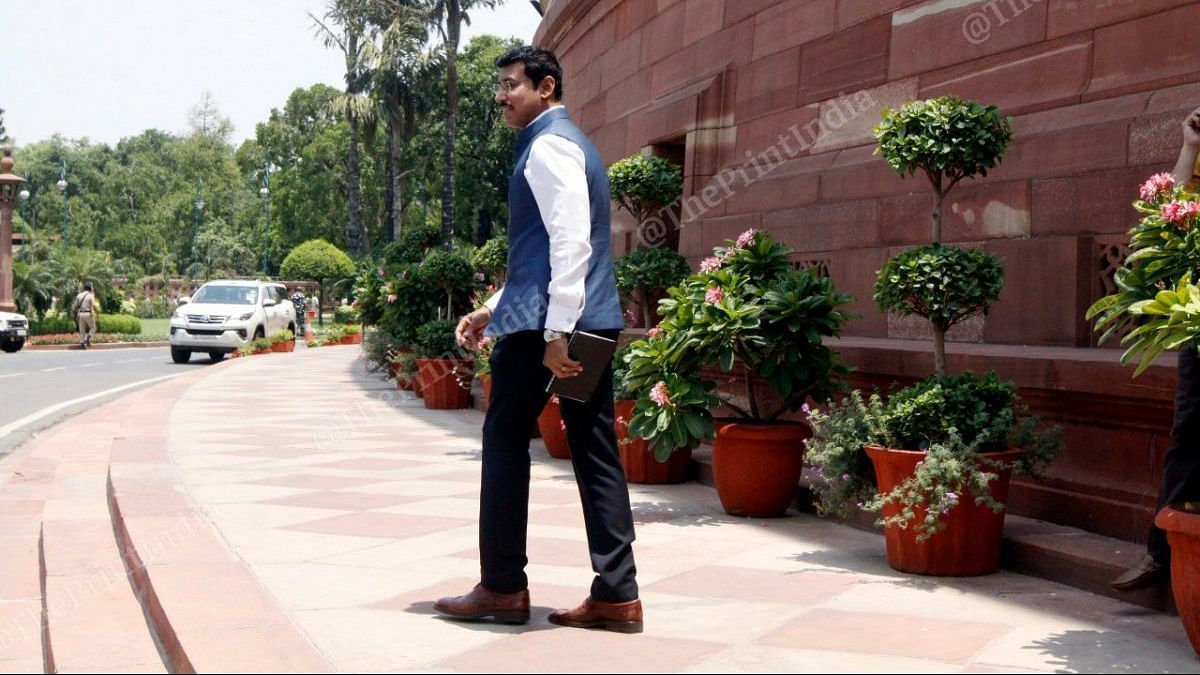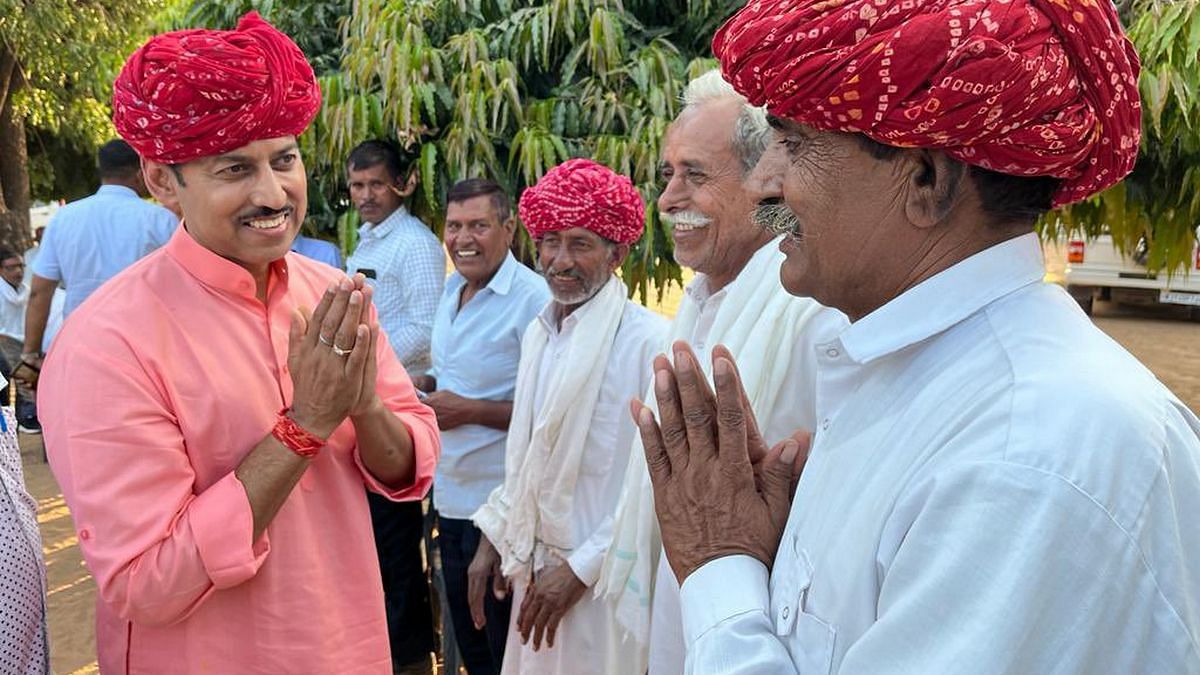In a wide-ranging discussion with ThePrint, Rathore said unemployment, crime, and corruption were the major issues working against the incumbent Ashok Gehlot government in the Rajasthan assembly election.
He also discussed the BJP’s decision not to name a chief ministerial candidate, the party’s vision for the state, the challenges facing the Congress, and why MPs like him are now vying for MLA seats.
Rathore also claimed that despite Gehlot trying to project a strong image, the Congress’s campaign was weak.
“Ashok Gehlot has no narrative to fight the assembly election. Instead of fighting the election on his work, he is bringing up the ERCP to target the central government,” Rathore said.
The demand for national status for the Eastern Rajasthan Canal Project (ERCP) and criticism of the central government in this regard is a cornerstone of the Congress’s campaign in the state.
This, according to Rathore, only shows that the Rajasthan government had “no work to show before the people”.
However, Rathore’s candidacy for his inaugural assembly election has not been without controversy.
In the faction-ridden Rajasthan BJP, His selection, along with that of Jaipur ‘princess’ Diya Kumari, is viewed widely as an effort to sideline former Chief Minister Vasundhara Raje’s prominence as a Rajput leader.
Rajsamand MP Diya Kumari was fielded from the “safe” Vidhyadhar Nagar assembly seat in Jaipur, denying a ticket to the incumbent MLA, Raje loyalist Narpat Singh Rajvi.
Rathore, also a Rajput, was chosen in place of former minister Rajpal Singh Shekhawat, also seen as a member of Raje’s ‘camp’.
Earlier this month, Rathore was shown black flags by supporters of Rajpal Shekhawat when he started his campaign in Jhotwara. Undeterred, he distributed sweets to the protesting cadres later and told reporters that he pledged “as an Army officer, Olympian, and a member of Team Modi” to serve the constituency.
Rathore joined the BJP in 2013 after retiring as a colonel in the Army. He won his first Lok Sabha election the following year, serving as a Union minister during the first term of the Narendra Modi government.
Also Read: ‘Gehlot se bair nahin, MLAs ki khair nahin’— why Congress’s bet on incumbents could backfire
‘Crime, corruption, & unemployment are main poll issues’
The BJP’s campaign in Rajasthan has revolved around taking the state government to task for law-and-order problems and corruption. Rathore claimed these issues have taken a toll on all sections of society.
“Crime, corruption, and unemployment have been the main issues in this election. Unemployment has risen, and corruption has increased under the nose of Gehlot’s government, whether it’s affecting women, youth, or farmers. They have all suffered under Gehlot’s government,” he said.
“Paper leaks have become the new norm, and even a political appointee member of the recruiting agency RPSC (Rajasthan Public Service Commission) was caught accepting money. Cash has been found in government offices” he said. “Even the state government has been implicated in corruption related to the central Jal Jeevan scheme.”
‘Gehlot is in a Catch-22 situation’
Gehlot’s strategy of image-building, Rathore said, could not stem the strong sentiment of anti-incumbency against Congress MLAs. He added that many underperforming sitting MLAs are again being fielded in this election because of political contingencies.
“Gehlot is in a Catch-22 situation now. He can’t take the risk of denying tickets to sitting MLAs because they will rebel. But in giving tickets, they will face people’s anger. They have no route for lowering anti-incumbency,” Rathore said.
As ThePrint reported earlier, the Congress has given tickets to dozens of incumbent MLAs. Party sources claimed that after the 2020 revolt led by Sachin Pilot, Gehlot promised to keep sitting MLAs if the government survived, and reneging on this could lead to rebellion.
Rathore said that the Congress’s campaign reflected the government’s lack of performance.
“For one month, when Gehlot was launching one scheme after another for image-building, people thought Congress was making progress. But they have nothing substantial to showcase to the people, despite being in power. They are resorting to bringing up the ERCP to target the Centre. If they had actually worked over the past five years, they wouldn’t need to emphasise other issues. Clearly, they haven’t delivered,” he said.
BJP’s narrative— security to Sanatana Dharma
The BJP is counting on its focus on transparency and efficiency, coupled with nationalism and Sanatana Dharma, to help it win the election, according to Rathore.
“The BJP has many plus points. It has destroyed the politics of middlemen by ensuring transparency in delivery mechanisms. The efficiency of the BJP’s work is a highly favourable aspect. The BJP’s commitment to nationalism is in sync with that of the people. The Congress is facing defeat due to its stance on Sanatana Dharma,” he said.
But more than anything else, Rathore suggested that the BJP’s narrative was issue-based.
“We are committed to improving people’s lives by ensuring government transparency, eradicating corruption, and maintaining strict law and order in the state. The BJP aims to provide water connectivity to every household through the Har Ghar Nal scheme, foster infrastructure development, and attract investments. Currently, Rajasthan is losing out to neighbouring states like Haryana and Madhya Pradesh when it comes to industrial investments,” he said.
“We plan to implement the Modi model of development, ensuring accountability in spending and establishing a direct correlation between national and state growth. Swift delivery of services is our priority, and we envision Rajasthan becoming a partner in the growth trajectory during Amrit Kaal,” he added.
According to Rathore, all of this could only happen once law and order is firmly established.
“Today, even a fourteen-year-old girl feels unsafe going to school if it’s more than 4 km away. Ensuring the safety of women is a critical issue that the BJP will address,” he said.
Question of CM face
Asked about the BJP’s lack of a chief ministerial candidate— unlike the 2018 election where Vasundhara Raje was front and centre— Rathore pegged it to the party’s strategy of taking a “collective approach”.
“It’s a party strategy, as straightforward as that. In certain environments, you need a collective approach rather than a single leader,” he said.
Rathore said that the only ‘face’ being promoted in Rajasthan was that of PM Modi.
“In Rajasthan, the BJP has decided that the Prime Minister will be the face. This decision means that the work culture and his style of governance will be highlighted. Government accountability will mirror that of the central government under the Prime Minister, and any government formed will operate in line with Modi’s style and accountability,” he added.
But could projecting a CM face have benefited the BJP in the campaign, especially since some people perceive the party as lacking recognisable state leadership?
To this, Rathore said: “Our primary goal is to win the election. As a political party, we are well aware of our strategy to achieve victory. Just as in a cricket match, where changing the opening batsman with a number three player is a part of the strategy, the chief ministerial face remains open. The parliamentary board will determine who will serve as the chief minister. What we are ensuring is that we are collectively focused on our current strategy.”
On MPs now vying for MLA seats
The BJP’s decision to field several sitting parliamentarians in assembly seats has fuelled speculation that the party simply doesn’t have enough strong leaders at the local level in Rajasthan.
Rathore was dismissive about such interpretations of the situation.
“This mentality of considering a constituency as one’s own kingdom has undergone a transformation within the BJP. Roles are assigned as needed, and there is no distinction between small and large responsibilities. Let me share that my geographical area has been reduced from eight assembly constituencies to just one, but the level of responsibility has increased. The focus is now on developing underserved areas,” he said.

Rathore added that leaders who had served as MPs were uniquely equipped to boost development in such places because they had taken lessons from Modi himself.
“As an MP, I have had the opportunity to work closely with Modi for 10 years, as have many others who have also served as MPs. We learn from his leadership. Why not bring this work culture to Rajasthan?” he asked.
Fielding MPs in the assembly election is “not a sign of weakness”, but a demonstration of strength, according to Rathore.
“We aim to enhance efficiency in Rajasthan’s work style, providing others with opportunities to become new members of the Lok Sabha and work with Modi.The BJP is the only party that offers ample opportunities for those who work with discipline,” he said. “It’s a new-age politics based on report cards and accountability, moving away from the old notions of rights and dynastic politics.”
(Edited by Asavari Singh)
Also Read: After ‘anti-Muslim’ row, new responsibility for Ramesh Bidhuri. BJP makes MP ‘poll in-charge for Tonk’

